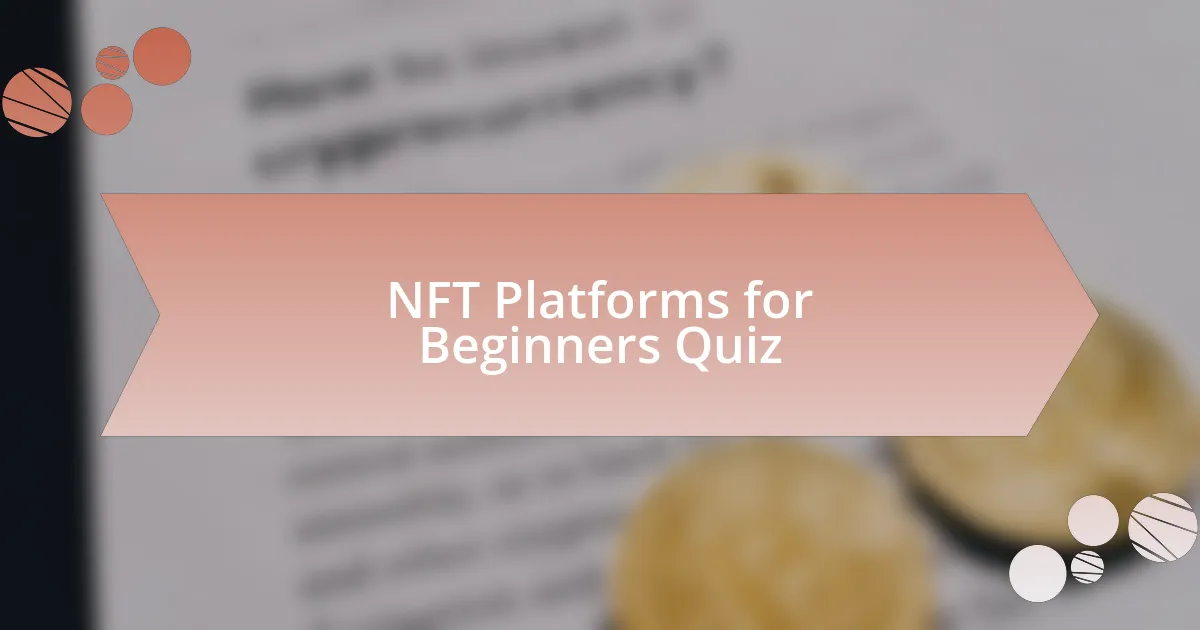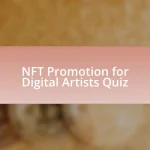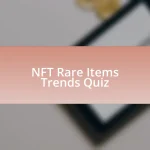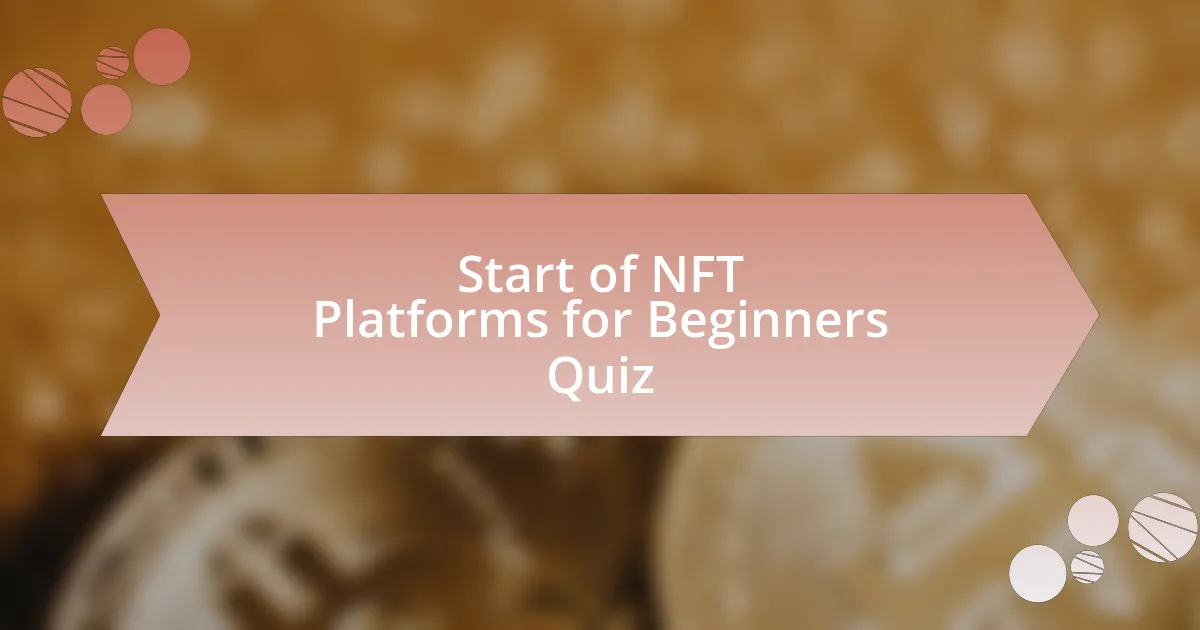
Start of NFT Platforms for Beginners Quiz
1. What is the primary function of Rarible?
- Rarible is a social media platform for connecting artists.
- Rarible is an NFT marketplace that allows users to create, buy, sell, and trade NFTs using their crypto assets.
- Rarible is a video streaming service for gaming content.
- Rarible is a cloud storage service for digital files.
2. Which NFT marketplace is known for its ease of use and quick setup?
- OpenSea
- Magic Eden
- Foundation
- Rarible
3. What is the name of the crypto wallet extension required to use Rarible?
- MetaMask
- Trust Wallet
- WalletConnect
- Coinbase Wallet
4. What type of NFTs are available on Rarible?
- Art-oriented NFTs.
- Game-oriented NFTs.
- Music-oriented NFTs.
- Fashion-oriented NFTs.
5. How does OpenSea differ from Rarible?
- OpenSea is exclusively for trading physical items and antiques.
- OpenSea offers a broader range of digital assets beyond just art, including sports collectibles and domain names.
- OpenSea has a strict limit on the types of NFTs allowed for sale.
- OpenSea only focuses on video game items and collectibles.
6. What is the name of the NFT marketplace with the highest all-time trading volume?
- SuperRare
- OpenSea
- Rarible
- Foundation
7. How does Foundation verify user accounts?
- By paying a fee for account approval.
- By connecting a MetaMask or WalletConnect wallet and verifying social media accounts via Twitter or Instagram.
- By downloading a mobile app for instant verification.
- By sending an email invitation from a friend.
8. What is the primary benefit of using Magic Eden for NFTs?
- Magic Eden offers low fees and rapid transactions, particularly for Solana NFTs.
- Magic Eden is primarily a social media platform for NFT artists.
- Magic Eden specializes in Bitcoin transactions and collectibles.
- Magic Eden requires a subscription fee for users to access its marketplace.
9. Which blockchain does Magic Eden primarily support?
- Solana
- Tezos
- Binance Smart Chain
- Ethereum
10. What is the name of the Binance NFT Marketplace?
- Binance NFT Marketplace
- Binance Collectibles Shop
- Binance Art Hub
- Crypto Art Exchange
11. How does Binance NFT Marketplace cater to beginners?
- It requires users to create a complex smart contract.
- It provides a familiar exchange interface with NFT integration for those new to crypto.
- It limits purchases to seasoned crypto investors only.
- It charges high fees for beginner transactions.
12. What are the best NFT marketplaces for artists and photographers?
- Foundation, SuperRare, and Zora.
- Joepegs, TofuNFT, and Hic et Nunc.
- Rarible, OpenSea, and Binance.
- Magic Eden, Objkt.com, and Kalao.
13. What is the unique feature of Rarible’s minting process?
- Rarible uses a `lazy minting` option.
- Rarible mints only from authorized users.
- Rarible limits minting to certain hours.
- Rarible requires upfront gas fees.
14. Which NFT marketplace supports Polygon-based NFTs?
- Magic Eden
- Foundation
- OpenSea
- Rarible
15. What is the name of the Tezos-based NFT marketplace with a wide range of digital art?
- Rarible
- Foundation
- Objkt.com
- OpenSea
16. How does Objkt.com cater to artists?
- It offers artist-friendly features and low minting costs.
- It restricts artists to specific styles only.
- It provides high commissions on sales.
- It has no support for digital art categories.
17. What is the name of the Algorand NFT marketplace with ease of use and minimal fees?
- Artiverse
- NFT Hub
- AB2 Gallery
- Crypto Art Shop
18. Which AVAX NFT marketplace focuses on metaverse assets and digital collectibles?
- Kalao
- Rarible
- OpenSea
- Joepegs
19. What is the name of the AVAX NFT marketplace with a growing number of collections and low fees?
- CryptoCollectibles
- Joepegs
- NFT Avenue
- ArtStation
20. Which NFT marketplace is known for its high trading volume and user-friendly interface?
- Magic Eden
- OpenSea
- Foundation
- Rarible
21. What is the name of the Solana-based platform offering integrated licensing options for NFTs?
- SolSea
- ArtStation
- Rarible
- OpenSea
22. How does SuperRare cater to artists?
- It sells physical art pieces to buyers globally.
- It helps users develop their own NFT platforms.
- It is a curated marketplace focusing on unique, high-quality digital art.
- It allows users to swap cryptocurrencies freely.
23. What is the name of the Cardano NFT marketplace offering easy-to-use features and low transaction costs?
- CNFT.io
- SuperRare
- OpenSea
- JPG.Store
24. Which Cardano NFT marketplace supports creators with tools to mint and sell their NFTs?
- JPEG Store
- OpenSea
- CNFT.io
- Rarible
25. What is the name of the Polygon-based marketplace specializing in gaming and collectible NFTs?
- PixelPlace
- MetaMarket
- CryptoArt
- TofuNFT
26. How does Zora empower artists?
- It limits artists to fixed pricing structures.
- It charges high fees for artists to sell their works.
- It gives artists full control over their works and pricing.
- It only allows artists to sell in bulk.
27. What is the name of the Tezos platform with artist-friendly features and low minting costs?
- Hic et Nunc
- Magic Eden
- OpenSea
- Rarible
28. Which Polygon NFT marketplace offers integration with Polygon for gas-free NFT trading?
- Magic Eden
- Foundation
- Rarible
- OpenSea
29. What is the name of the Algorand-based NFT platform with a wide range of collections?
- Art Haven
- Crypto Collectibles
- Rand Gallery
- NFT Paradise
30. How does Foundation support creators?
- It only supports creators from specific regions.
- It restricts the types of NFTs that can be created by users.
- It charges high fees for listing artworks inefficiently.
- It provides a community of members to help support creators on their journey.
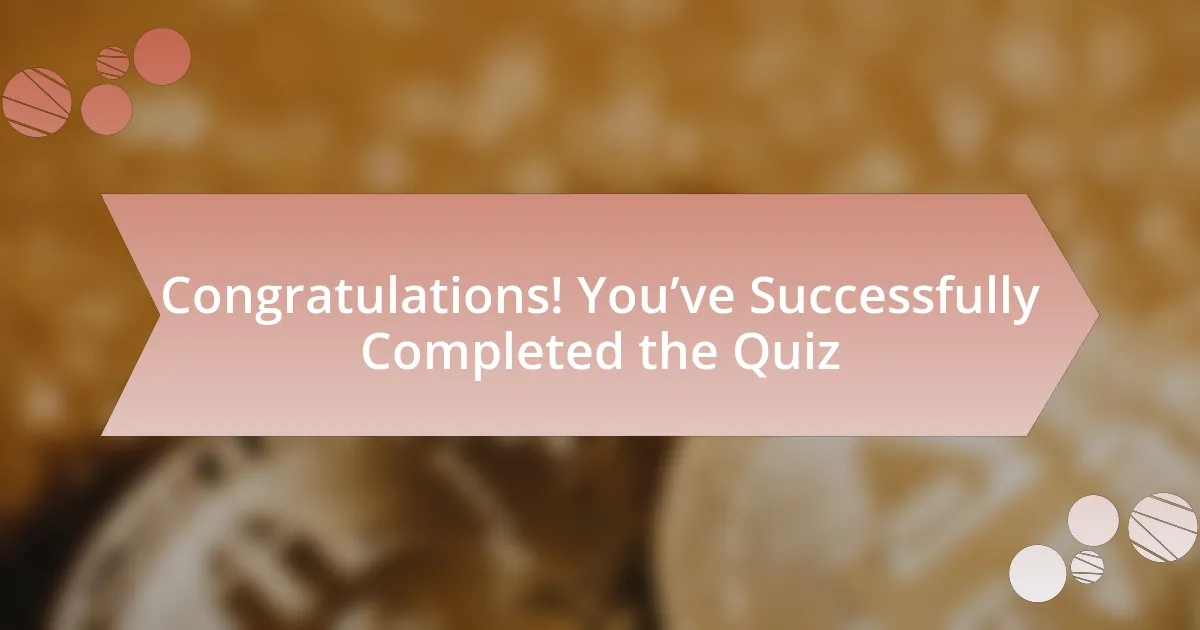
Congratulations! You’ve Successfully Completed the Quiz
Thank you for participating in our quiz on NFT Platforms for Beginners! We hope you found it informative and enjoyable. Quizzes like this can be a fun way to test your knowledge and learn new concepts in the rapidly changing world of NFTs.
Throughout the quiz, you may have discovered key aspects of various NFT platforms, their unique features, and how they cater to different audiences. Understanding these platforms is vital for anyone looking to venture into the NFT space. This knowledge can help you make informed decisions as you explore creating, buying, or selling NFTs.
If you’re eager to deepen your understanding of NFT platforms, we invite you to check out the next section on this page. It is filled with valuable insights and resources that will enhance your learning experience. Dive in and expand your knowledge further in this exciting area!
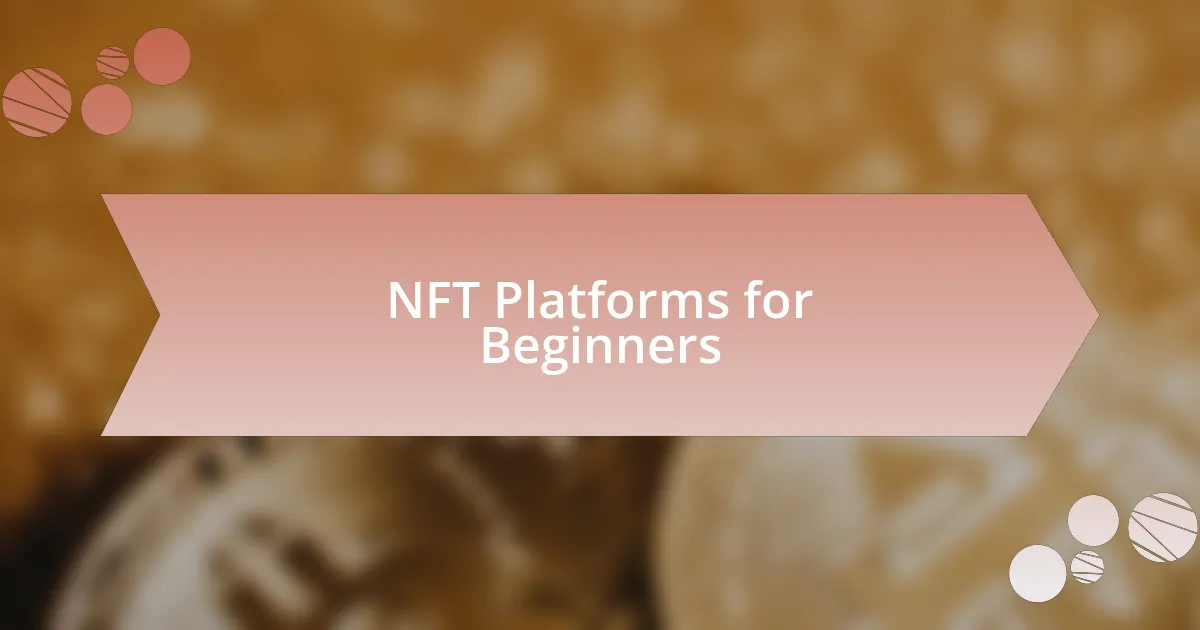
NFT Platforms for Beginners
Understanding NFT Platforms
NFT platforms are online marketplaces where users can create, buy, sell, and trade non-fungible tokens (NFTs). These tokens represent ownership of digital assets such as art, music, and virtual goods. They leverage blockchain technology to ensure the uniqueness and security of each token. Popular platforms include OpenSea, Rarible, and Mintable, each offering various user interfaces and features to support NFT transactions.
Types of NFT Platforms for Beginners
There are primarily two types of NFT platforms: generic and specialized. Generic platforms, like OpenSea, allow a variety of NFT types, from art to virtual real estate. Specialized platforms, such as Foundation or Nifty Gateway, focus on specific niches like digital art or collectibles. Beginners should explore both types to find the right fit for their interests.
Features of Beginner-Friendly NFT Platforms
Beginner-friendly NFT platforms typically offer user-friendly interfaces, intuitive design, and educational resources. Features may include step-by-step guides for minting NFTs, transparent fee structures, and customer support options. Some platforms also provide free NFT creation options, attracting new users without the burden of upfront costs.
Buying and Selling on NFT Platforms
Buying and selling on NFT platforms is a straightforward process. Users can browse listings, place bids, or buy items at a fixed price. Sellers can create listings by uploading their digital assets, setting prices, and choosing auction or sale formats. Understanding gas fees and the listing process is important for smoother transactions.
Security Considerations for NFT Beginners
Security is crucial when using NFT platforms. Beginners should prioritize platforms with strong security measures, such as two-factor authentication and user reviews. Moreover, users should store NFTs in secure wallets, prefer reputable marketplaces, and be cautious of scams or phishing attempts. Researching platform protocols can minimize risks significantly.
What are NFT platforms?
NFT platforms are online marketplaces that allow users to create, buy, sell, and trade non-fungible tokens (NFTs). These platforms provide the necessary tools for artists and collectors to manage digital assets securely using blockchain technology. Prominent NFT platforms include OpenSea, Rarible, and Foundation, which facilitate transactions by leveraging Ethereum or other blockchain networks.
How do NFT platforms work?
NFT platforms operate by enabling users to mint, list, and trade NFTs. Users create NFTs by uploading digital files such as art or music, which are then encoded into a blockchain with unique identifiers. The platforms handle transactions, ensure ownership, and help in showcasing digital assets. Users can buy, sell, or auction NFTs through these interfaces, often using cryptocurrency as payment.
Where can I find NFT platforms?
NFT platforms can be found online through their respective websites. Some of the most popular platforms include OpenSea, Rarible, and Mintable. They feature user-friendly interfaces that guide newcomers through the process of buying, selling, and creating NFTs. Additionally, many platforms have community forums and social media channels for further engagement.
When should I use NFT platforms?
You should use NFT platforms when you want to buy, sell, or create digital assets that are unique and verifiable. Engaging with these platforms is ideal when you have digital art, music, or collectibles that you wish to monetize or showcase. Timing also matters; participating during significant art drops or auctions can increase your chances of discovering valuable NFTs.
Who can use NFT platforms?
Anyone can use NFT platforms, including artists, collectors, and investors. Artists can mint and sell their works, while collectors can purchase unique digital assets. Investors may seek to buy NFTs for potential resale or speculative value. Most platforms require users to set up a digital wallet to facilitate transactions, making it accessible to anyone with an internet connection.

